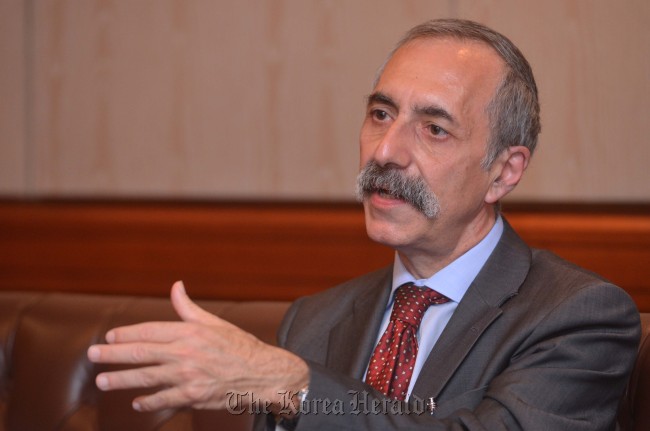Academic advocates global cooperation in return of cultural properties
By Korea HeraldPublished : Oct. 17, 2012 - 19:50
Cites France’s return of Korea’s Uigwe books as good example of cooperation
An Italian expert on cultural heritage repatriation on Tuesday praised the inter-governmental cooperation between Korea and France in sharing ownership of disputed historical books and moving forward to a new future.
He also called for an internationally shared understanding in heritage repatriation and cooperation in cases involving illegally obtained cultural properties.
“I think it was a win-win situation for both countries. Korea was able to keep the books in the state of origin, close to heart, while the French could save face by giving it as a long-term lease,” said Tulio Scovazzi, a professor of international law at the University of Milan, referring to the repatriation of Joseon-period royal texts to Korea last year.
An Italian expert on cultural heritage repatriation on Tuesday praised the inter-governmental cooperation between Korea and France in sharing ownership of disputed historical books and moving forward to a new future.
He also called for an internationally shared understanding in heritage repatriation and cooperation in cases involving illegally obtained cultural properties.
“I think it was a win-win situation for both countries. Korea was able to keep the books in the state of origin, close to heart, while the French could save face by giving it as a long-term lease,” said Tulio Scovazzi, a professor of international law at the University of Milan, referring to the repatriation of Joseon-period royal texts to Korea last year.

In 1993, then French President Franois Mitterrand proposed that the country would return 297 volumes of the manuscripts recording and illustrating royal protocols of the Joseon Kingdom (1392-1910). The books were looted from Korea in 1866 during the French troops’ invasion of Ganghwa Island. But Korea had to wait another 18 years for the items to be repatriated in the form of a long-term renewable lease.
“Yes, it took many years and Korea did not get sole ownership. But the result has set a great example to many other countries seeking the restitution of their cultural properties,” he said.
Scovazzi attended the International Conference of Experts on the Return of Cultural Property 2012 hosted by the Cultural Heritage Administration, UNESCO and the Overseas Korean Cultural Heritage Foundation aimed at sharing current situations and international cooperation in repatriation. The two-day conference had 200 attendees with 12 speakers from abroad. At the meeting the CHA signed a memorandum of understanding with the Greek culture ministry to exchange information about property repatriation.
In his keynote speech at the meeting, Scovazzi noted that the restitution of illegally obtained cultural properties is a global trend, which suits the circumstances in Korea. The country is now preparing to bring back cultural heritage items believed to have been looted during the Japanese colonial era (1910-1945). The government estimates the number of Korean cultural property items overseas at about 150,000, of which a considerable number were taken out of the country illegally.
Italy is considered a leading example of a state pushing to have its illegally taken cultural artifacts returned from abroad. In 1815 it filed the very first governmental request to reclaim cultural properties looted by Napoleon. In 2008, some Italian museums regained the ownership of valuable items from museums in the U.S. verified to have been illegally traded.
Italy also leads the trend of returning such assets as well. In 2003 about 50 pieces of Goryeo celadon ware and other valuable art pieces were returned to Korean museums after the Italian authorities notified its Korean counterpart about an auction where the items were to be put on the block. The Italian government also blocked the trade and arranged for Korean museums to purchase them.
“Some people may ask why cultural asset repatriation is so important. I say it is a moral issue. Cultural properties are the root of a nation. If there is evidence of injustice linked with the acquisition of the assets, they should stay close to people who have inherited the spirit inside them,” Scovazzi added.
By Bae Ji-sook (baejisook@heraldcorp.com)
-
Articles by Korea Herald







![[Graphic News] More Koreans say they plan long-distance trips this year](http://res.heraldm.com/phpwas/restmb_idxmake.php?idx=644&simg=/content/image/2024/04/17/20240417050828_0.gif&u=)
![[KH Explains] Hyundai's full hybrid edge to pay off amid slow transition to pure EVs](http://res.heraldm.com/phpwas/restmb_idxmake.php?idx=644&simg=/content/image/2024/04/18/20240418050645_0.jpg&u=20240419100350)






![[From the Scene] Monks, Buddhists hail return of remains of Buddhas](http://res.heraldm.com/phpwas/restmb_idxmake.php?idx=652&simg=/content/image/2024/04/19/20240419050617_0.jpg&u=20240419175937)

![[KH Explains] Hyundai's full hybrid edge to pay off amid slow transition to pure EVs](http://res.heraldm.com/phpwas/restmb_idxmake.php?idx=652&simg=/content/image/2024/04/18/20240418050645_0.jpg&u=20240419100350)

![[Today’s K-pop] Illit drops debut single remix](http://res.heraldm.com/phpwas/restmb_idxmake.php?idx=642&simg=/content/image/2024/04/19/20240419050612_0.jpg&u=)